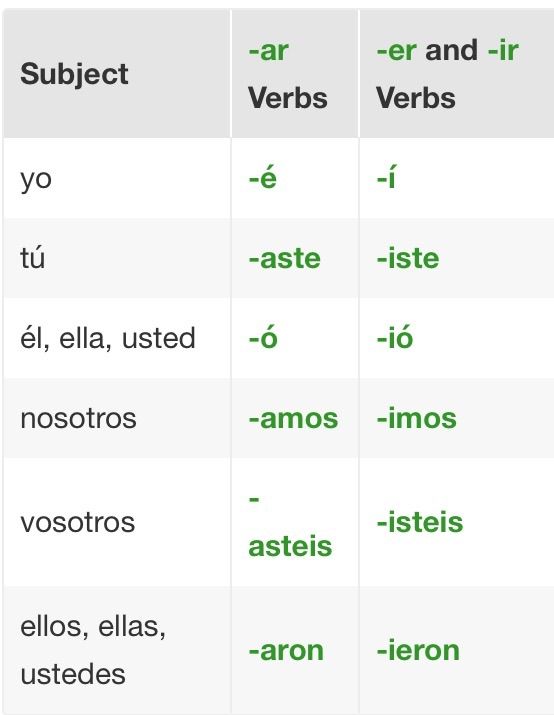

IR: Vivir, Escribir, Subir, Describir, Dormir*.ER: Comer, Ver*, Correr, Conocer*, Saber*.

In Spanish, it’s easy to tell when a word is a verb because all verbs end in one of these three ways. The perspective or the subject of the verb will change how it's conjugated. You guys/you all → Vosotros (only used in Spain, otherwise use ellos, ellas, or ustedes).The six perspectives for conjugating verbs are:

There are only 6 perspectives you need to know, and they line up with the cells in the chart shown above. In order to conjugate verbs, you must be speaking about a specific person or subject.
#Ar verb endings in spanish preterite for free
You can download it for free on yourĪndroid. If you want over 400,000 Spanish verb conjugations with you where ever you go, try Spanish Translator + app. You will find charts to master Spanish verbs ending in IR, ER, AR and more.
#Ar verb endings in spanish preterite how to
This guide will help you learn how to conjugate verbs correctly for past, present and future tenses. That helped fix the word "winter" in my mind, and then it was easier to remember "autumn" after then.Conjugating verbs in Spanish is one of the most challenging parts of learning Spanish as a second language. When I made some notes after listening, I wrote "winter" many times. But then I listened to a podcast about winter in Korea, and they repeated the word "winter" a lot. I'm trying to learn Korean, and I always mixed up the words "autumn" and "winter" because they sound similar to me. I can give you an example from my own experience. When the word feels comfortable and fixed in your vocabulary, move on to "borrow". Banks lend money) focusing on that word, look out for it when you are reading or listening, or search for "lend" in a dictionary and read the example sentences there. You could also write some example sentences (e.g. Can you lend me your phone? Can you lend me some money?) and look for opportunities to really ask those questions. For example, if you focus on "lend", you can make some questions to ask to people (e.g. Choose one to focus on first, and practise it. If this happens to you, I would suggest learning them one by one. That means that their meanings can easily become confused in our memory. All of these things can be cues for your memory.Īlso, difficulty may appear because you are learning "lend" and "borrow" at the same time, and their meanings are related. When you use the new words, it forces you to think about the words more, associate them with other words, and put them into a meaningful context. For example, try to use the words when you are writing your diary, talking to someone, or taking an English class. I would suggest that as part of your vocabulary learning, you try to use the words in meaningful conversations, writing or speaking. Most verbs have a past tense and past participle with –ed:īut many of the most frequent verbs are irregular: Base form


 0 kommentar(er)
0 kommentar(er)
